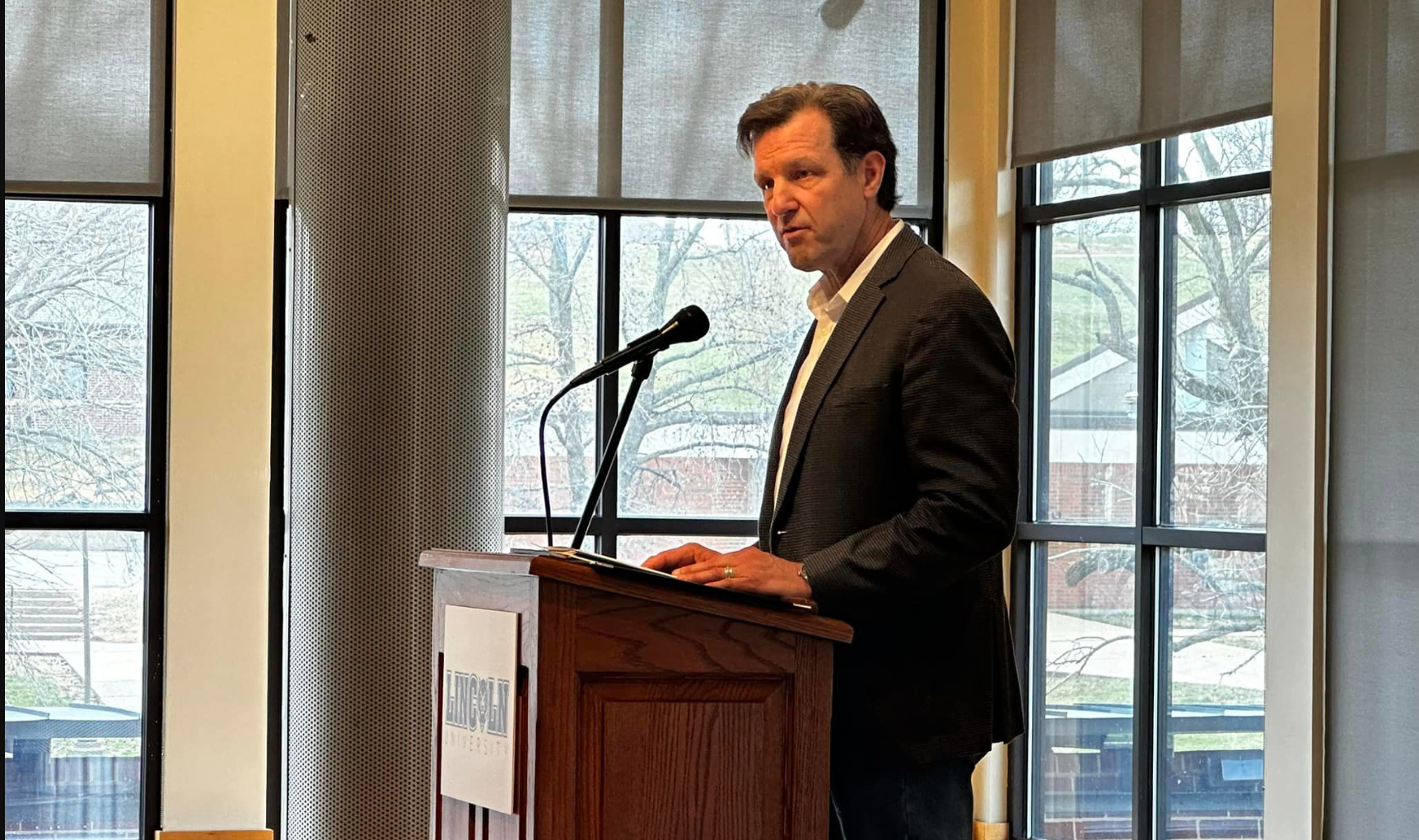Mail-in ballots, ranked-choice voting part of Missouri Democrat plan for presidential primary

Democrats in Missouri, like their counterparts nationally, will use 2024 to test a new system for determining the party’s presidential preference now that the public primary for all parties has been abolished.
Instead of reverting to a caucus-only system, the process used in most elections prior to 2000, the Missouri Democratic Party is seeking comment on a plan that will use mail-in ballots and four hours of in-person voting on a Saturday – March 23 – to gauge party sentiment.
Russ Carnahan, chairman of the Missouri Democratic Party, said in an interview last week that the cash-strapped party has a projected budget, along with donors lined up to help finance the party-run primary, but he declined to reveal either.
According to the latest disclosure filings, the party had $14,277 in an account for federal elections and $9,184 on hand in its state account. The state report to the Missouri Ethics Commission, for the quarter ending June 30, showed expenses exceeding income.
“It is a daunting task,” Carnahan said. “It’s different. We were sort of served this cow pile, to put it mildly, stuck with this state law the way it is.”
To cast a vote in the primary, Democratic voters will have to ask the party for a ballot that will be returned by mail for tabulation. The plan calls for the party to have at least one in-person voting location open for four hours on March 23, with extra polling locations in the St. Louis and Kansas City metropolitan areas.
“There is an expense, but we think it is worth it to allow for more participation and more engagement with the public,” Carnahan said.
The party is also experimenting with ranked-choice voting. Anyone casting a ballot will be asked to rank their three preferences among the listed candidates.
A candidate must receive 15% of the vote in a congressional district to win district delegates and 15% statewide to win at-large delegates. Votes for candidates ranked as the first preference who do not meet those thresholds will be distributed based on second and third preferences until every vote is assigned to a candidate meeting or beating the threshold.
“The bottom line is that the very important piece of this is voter education, so we’re gonna have to do a lot of training for our local folks,” Carnahan said.
Primary history
The first modern presidential primary, with delegates pledged to a candidate by the outcome, was held in 1912 in North Dakota. Democrats nationally this year are rearranging their primary schedule, moving Iowa and New Hampshire, traditionally the first states to vote, behind South Carolina and Georgia.
Missouri’s first primary was in 1988, a one-off contest enacted by a Democratic legislature to benefit then-St. Louis Congressman Dick Gephardt.
Gephardt won the primary but lost the presidential nomination.
A permanent primary was created for the 2000 election. There was bipartisan support for the primary, with Gephardt again in the contest for the Democratic nomination and then-U.S. Sen. John Ashcroft seemingly prepared to enter the GOP contest.
The Republican-controlled legislature repealed the law authorizing the primary in 2022. An attempt was made to revive the primary in this year’s session – Carnahan and GOP state Chairman Nick Myers testified in favor of it – but the bill died in the gridlock that gripped the state Senate during the final week of this year’s legislative session.
On average, 480,000 Democrats and 450,000 Republicans voted in each of the six primaries since 2000. The actual number varied widely, depending on whether there was an incumbent seeking a second term.
In 2008, when both parties had contested nominations, 1.4 million people voted in the primary, including more than 825,000 Democrats. In 2016, when both nominations were again open contests, almost 1.6 million voted, including more than 935,000 Republicans.
Only 73,000 Democrats voted in 2012, as President Barack Obama was seeking re-election and only 123,000 Republicans voted in 2004 when President George W. Bush was running for a second term.
In 2024, President Joe Biden so far faces no strong challenge renomination, so Democratic turnout would likely not be very high. But that is not a reason to return to the caucus system, Missouri’s traditional method of selecting convention delegates, Canahan said.
“The problem with the caucus is such limited participation in overall numbers,” he said.
Only about 1% of voters take part in caucuses, he said. There are many reasons people who would vote in a primary can’t get to a caucus, he said.
“If you’re handicapped, elderly, you’re in the military, you’re going to work, you’ve got family obligations, you’re out of town,” Carnahan said. “You can name all the reasons people have a hard time getting to a meeting.”
While the primaries in recent election years have divided the state’s national convention delegates, the caucus system has continued to select the individual delegates.
With small numbers of participants, caucuses are also susceptible to well-organized groups seeking to control delegate selection. In 2012, police were called to the St. Charles County Republican caucus after supporters of Ron Paul – who received 12.7% of the county’s primary vote – disrupted proceedings in an effort to control the meeting.
Carnahan said he doesn’t see any likelihood of a repeat of that scene when Democrats hold their mass meetings in April 2024.
“I have a really very minimal concern with that,” Carnahan said.
Next steps
The Democratic State Committee must adopt a delegate selection plan and will consider the party-run primary at a meeting that has not yet been scheduled. Afterwards, it must be submitted to the national party for approval.
The Republican Party has not released its delegate selection plan, but it seems likely to use a caucus-only system.
The Democratic Party is working with vendors and talking to other state parties, some of which have run primaries, to work through the logistics, he said.
The goal will be to avoid a debacle like the 2020 Iowa caucuses, where that state’s Democratic Party adopted a virtual voting system that would be used alongside its traditional caucuses. It failed horribly and three weeks after the vote no one had valid results.
The party is using paper ballots and centralized tabulation of the mail-in ballots, augmented by the local counts after in-person voting concludes. The results should be available soon but the most important aspect of the primary is for voters to feel they had a voice in the process, Carnahan said.
“The best option for a hybrid system is to do the caucus, with the mail-in ballot, and that accommodates a lot of people that have a hard time getting to an actual meeting,” he said. “So it’s just for our engagement in reach and participation. Given the limitations of the current state law, it looks like the best we can do.”
Miss Clipping Out Stories to Save for Later?
Click the Purchase Story button below to order a print of this story. We will print it for you on matte photo paper to keep forever.

